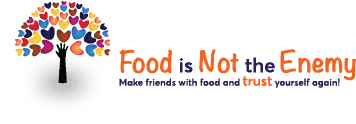Food is fuel for your body. It gives you the energy you need to go through your day, to work, to play, to study, to parent, to enjoy life. You expend energy while you do those things and food helps you replace the energy so you can keep going.
Without enough food, you get tired, weak, distracted. Your body hates it when you don’t feed it enough. It yells at you with tummy grumbles and makes you yawn to get its point across. If you don’t listen to it and get too hungry, your body and mind will start to obsess about food. It will think about it and think about it and everything it sees starts to be about eating. Your body needs fuel and will stop at nothing to get it, even if it has to borrow from itself.
Your body also doesn’t like to be too stuffed. Too much food makes it work hard to digest it and leaves you feeling tired and physically uncomfortable.
Eating too much or too little sometimes is not a problem. Your body is a complex machine that compensates quite well for human error. However ongoing issues with eating too little or too much can bring about strong consequences.
Learning to get in touch with and familiar with your body’s cues of hunger and satiety is very important for recovery. Not only will it help you to use food as fuel but it will also inform you of when you are having emotions rather than needing fuel.
For example, if you start thinking about eating when you aren’t hungry yet, this is a good indication that you are having a feeling. Now you have the choice to address the emotion, rather than eat to push it down.
So how do you learn to listen to what your body is telling you about your hunger, satiety, and emotions?
The Hunger Scale
Imagine a scale from 1-10. If you are at a 1 on the scale, you are so hungry you feel as though you are starving. If you are at a 10, you are so full you can barely move.
Rate your hunger, right now, on this 1-10 scale. Where do you fall? What physical sensations are you aware of that tell you this?
The goal is to eat when you are at about a 3 on the scale and to stop at a 6 or 7. Certainly, you don’t want to be too hungry before you eat, or you are likely to eat too much and too fast, without even tasting it.
As you eat, notice your body’s sensations. Perhaps the moment you start to feel a pang of fullness, stop eating. You are now at about a 7 on the scale and have eaten what your body needs.
After some practice, you will learn how much food your body needs and can respond to your body’s signals rather than emotional signals. It may take several days or weeks of paying attention to this to learn to listen to your body and to learn what the right amount is for you.
Start by creating your own hunger scale. Write out or draw a scale from 1-10. Start with starving hunger in the 1 position and end with stuffed to the gills in the 10 position. Do your best to describe all the other positions on this scale based on what you know or imagine about yourself.
After creating your own hunger scale, now is the time to try it out. Check in with your body before you eat. What number are you on the scale? Write it down. Check in with your body in the middle of your meal. I suggest putting down your fork and putting all your attention on your body. Write down where you are on your hunger scale. After the meal is over, write down the number in which you are on the scale.
I also suggest writing down what you are feeling before and after your meal. This will help you identify any emotional triggers that are leading you to eat. If you wish, also include the time of the meal and where you are eating it. This information will help you as you learn more about yourself, allowing your relationship with food to inform you of what is going on in your life. For example, if you always eat dessert in the privacy of your own home, you might discover that you feel ashamed of wanting ice cream. This may be important emotional work to do.
You can also write what you eat, but only if it will help you to learn more about yourself. I caution against putting too much focus on the food aspect. If however, what you eat brings about certain emotional patterns, that is helpful information. If you are only obsessing about the amount of calories you are eating, then challenge yourself not to write down what you eat.
I also strongly suggest filling out this hunger scale while you are engaged in eating. To think back on it later will only result in incorrect data. You will not be in touch with your body or your emotions later, it will only be a guessing game. If you must write it down later, at least reflect on it, determine the number on the scale and your emotions at the time of the meal and remember them for later. This is much more productive then attempting to recreate what you were feeling. It just won’t work.

